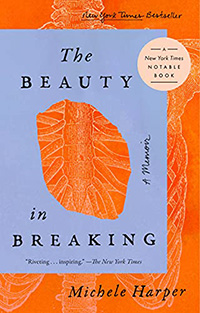 Michele Harper, The Beauty in Breaking: A Memoir (New York: Riverhead Books, 2020), 284pp.
Michele Harper, The Beauty in Breaking: A Memoir (New York: Riverhead Books, 2020), 284pp.
Michele Harper's memoir reminded me of the famous first paragraph of Scott Peck's book The Road Less Traveled (1978): "Life is difficult. This is a great truth, one of the greatest truths. It is a great truth because once we truly see this great truth, we transcend it." Her own version of this great truth comes at the very end of her book: "Brokenness can be a remarkable gift. If we allow it, it can expand our space to transform." (278).
Harper brings a rich background to her thoughtful reflections. She's an African American woman, a graduate of Harvard, and an emergency room physician. She's also a survivor of a violently abusive father. Her otherwise upper middle class childhood was "a war zone." She also survived a first marriage that ended in divorce after thirteen years, which divorce was a second abandonment of a stable emotional home life that she never had.
"Stripped to my core," Harper meditates on her evolving personal development and her professional growth — healing herself, and bringing healing to her patients. On the personal front, she cultivates stillness. She does yoga and hits the gym. She endured a "dismal interlude" of online dating. She learns that self care is not selfish. As a black, woman physician, she reflects on her experiences of race, gender, power, and privilege. She listens carefully and deeply to her patients and what she experiences in her emergency room: the death of a newborn baby, a teenager with his his face blown off by a gunshot, and other colorful and eccentric patients. She negotiates the complicated bureaucracy of our health care systems.
In the end, Harper observes that true wellness cannot come solely from a bottled prescription: "If we humans could expand our definition of healing, there would be more of it." Having been broken at home and at work, Harper appeals to the Japanese art of Kintsukuroi, in which one repairs broken pottery by filling in the cracks with gold, silver, or platinum. The precious metals highlight the brokenness, and suggest that something imperfect can be even more beautiful than the original. "In life, too," she writes, "even greater brilliance can be found after the mending."
Dan Clendenin: dan@journeywithjesus.net


